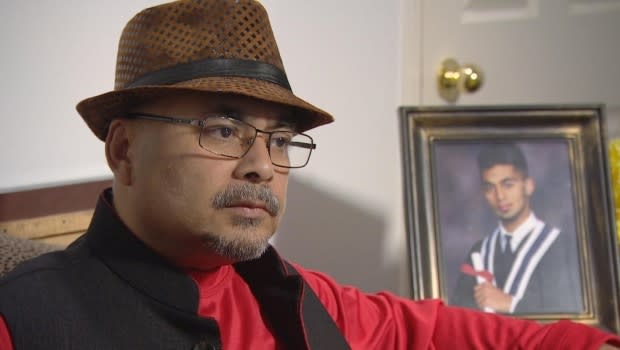A young man dies while on suicide watch, but there's no courtroom in Toronto to hear the case
For nearly seven years, one thing has kept Rakesh Tiwari from performing funeral rites for his son: an answer to how his boy could have taken his own life while he was in a hospital psychiatric unit under suicide watch.
"I didn't want to let him go just like that," Tiwari said.
That answer was supposed to emerge during a wrongful death lawsuit against the William Osler Health System's Brampton Civic Hospital. The family filed the $12.5 million suit in 2015 and has been waiting for its day in court ever since.
But now, Tiwari will have to wait even longer to bid his son goodbye.
The reason: there isn't a single courtroom available in the Toronto area to hear Prashant Tiwari's case.
It's a problem Ontario's Ministry of the Attorney General acknowledges outright, saying it is working with its legal partners to find ways to address the delays and backlogs within the province's justice system.
A recent report by provincial Auditor General Bonnie Lysyk found Ontario courtrooms operated for only 2.8 hours on an average businesses day, with nearly three-quarters of all courthouses reporting "above-average" delays.
A cry for help
Tiwari can still remember the day Prashant came to him, self-inflicted wounds all over his neck and chest, telling his father he needed help. It was June 16, 2014.
Tiwari did the one thing he thought he was supposed to do in that moment: take his son to the hospital.

Ten days later, Prashant was dead — according to the lawsuit, the 20-year-old had hanged himself in the hospital's bathroom.
He was allegedly left unattended for two hours and 40 minutes before staff found his body. Tiwari believed staff were supposed to check on his son every 15 minutes.
After his death, the statement of claim alleges, 12 people accessed Prashant's medical records without proper authorization for unknown reasons. None of the allegations has been proven in court.
William Osler Health System, the organization that runs the hospital, has previously said, "While we do not comment on an individual patient case, we have and continue to express our sincere condolences for the family's loss."

Just how a young man could have died by suicide when he was supposed to be under the watchful eye of hospital staff is the question that haunts Prashant's family.
'We were at the steps of the courthouse'
On Jan. 8, 2020, they thought they would be able to begin answering that question.
"We were at the steps of the courthouse, we were ready to start the trial and frankly the hospital was ready," the family's lawyer Michael Smitiuch told CBC News.
But once inside the courthouse, they learned there were no courtrooms — not in Brampton, Toronto, Milton, Kitchener or Orangeville — to hear the case until 2021.
"There's a saying, justice delayed is justice denied, and that's the case here," Smitiuch said.

To prepare for the case, Tiwari and his other son, Gautam Tiwari, had to undertake the painful process of gathering all of Prashant's paperwork: photos, medical records, letters, all windows into the pain he was living through.
"So we're very vividly reliving the trauma," said Gautam. "Then, when we're told we have to delay, it's like now we're going to have to go through all of this all over again a year from now."
Their lawyer acknowledges court staff and judges are doing their best under the constraints, but says much more funding needs to be allocated toward the justice system for it to deliver justice.
'Funding is crucial' for court system
"Funding is crucial from the Ontario government," said Smitiuch. "They need to throw more resources at the court system. We also need more judges — there's no doubt that there is a need for the federal appointment of judges."
As part of its efforts to help cut down on the backlog, the Ministry of the Attorney General says it has expanded access to a "Simplified Procedure" process. Starting Jan. 1, 2020, Ontarians with civil court claims up to $200,000 can use that expedited process, which the ministry hopes will result in reduced wait times.
The Small Claims Court limit has also been increased to $35,000, which should see many civil cases diverted from the Superior Court, freeing up resources for other cases.
"With respect to criminal court delay, the right to be tried within a reasonable time is a fundamental part of our justice system," ministry spokesperson Brian Gray said in a statement.
I'm losing hope inside my head and my heart. - Rakesh Tiwari
But while the auditor general flagged the delays in access to justice in her 2019 report, she also highlighted a lack of data that would have provided a clearer picture of just how deep the problem runs.
"During our audit, we experienced significant scope limitations in our access to key information related to court scheduling ... As a result, we were unable to assess whether public resources, such as courtrooms, are scheduled and used optimally to help reduce delays," the report said.
This year, when Prashant should have turned 27, Tiwari is left wondering if he'll ever see justice for his son.
Not only does he feel let down by the medical system, but by the court system too.
"It's delay after delay," he said. "I'm losing hope inside my head and my heart.
"How many more lives have to be lost?"
Where to get help
Canada Suicide Prevention Service
Toll-free 1-833-456-4566
Text: 45645
Chat: crisisservicescanada.ca
In French: Association québécoise de prévention du suicide: 1-866-APPELLE (1-866-277-3553)
Kids Help Phone:
Phone: 1-800-668-6868
Text: TALK to 686868 (English) or TEXTO to 686868 (French)
Live Chat counselling at www.kidshelpphone.ca
Post-Secondary Student Helpline:
Phone: 1-866-925-5454
Good2talk.ca
Canadian Association for Suicide Prevention: Find a 24-hour crisis centre
If you're worried someone you know may be at risk of suicide, you should talk to them, says the Canadian Association for Suicide Prevention. Here are some warning signs:
Suicidal thoughts.
Substance abuse.
Purposelessness.
Anxiety.
Feeling trapped.
Hopelessness and helplessness.
Withdrawal.
Anger.
Recklessness.
Mood changes.

